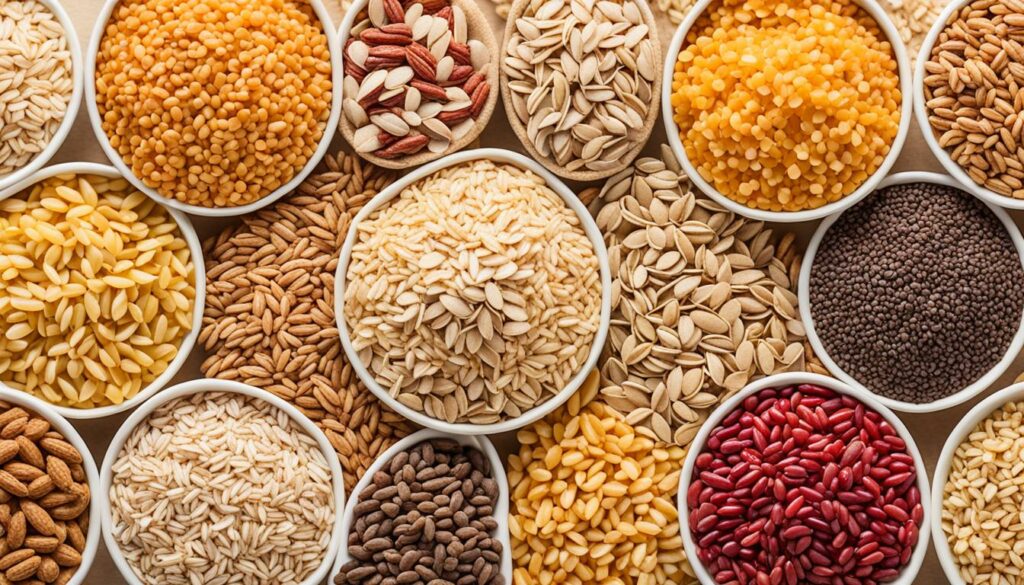Embark on a transformative culinary adventure with the Mediterranean diet, a time-honored approach to eating that has captivated health-conscious individuals around the world. In this comprehensive guide, we’ll explore the fundamentals of this nourishing lifestyle and uncover how you can easily incorporate its principles into your everyday life. Whether you’re seeking to improve your overall well-being, achieve sustainable weight loss, or simply savor the delicious flavors of Mediterranean cuisine, this diet offers a balanced and flavorful path to better health.
Key Takeaways
- Discover the foundations of the Mediterranean diet and how it can transform your health
- Explore the benefits of embracing a plant-based, whole food approach to eating
- Learn strategies for achieving portion control and mindful eating for weight management
- Understand the role of anti-inflammatory foods, such as olive oil and fresh produce, in promoting heart health
- Discover the power of whole grains and plant-based proteins to fuel your body and mind
Embrace Healthy Eating Habits with the Mediterranean Diet
Embarking on a mediterranean lifestyle is more than just following a meal plan – it’s a holistic approach to wellness that emphasizes the importance of mindful eating, social connection, and physical activity. By understanding the core principles of this way of life, you’ll be better equipped to make sustainable changes that positively impact your health and well-being.
Understanding the Mediterranean Lifestyle
The mediterranean lifestyle is rooted in the traditional dietary and cultural practices of countries bordering the Mediterranean Sea, such as Greece, Italy, and Spain. At its heart, this approach to living promotes a balanced, plant-based diet rich in fresh produce, whole grains, and healthy fats.
- Emphasis on seasonal, locally-sourced ingredients
- Incorporation of anti-inflammatory foods like olive oil, nuts, and seafood
- Celebration of shared meals and social connections
- Integration of physical activity into daily routines
The Benefits of a Plant-Based Diet
Adopting a plant-based diet as part of the mediterranean lifestyle can have numerous heart-healthy benefits. By prioritizing whole, minimally processed foods, you can take a proactive approach to your well-being:
- Improved cardiovascular health through the consumption of anti-inflammatory fats and fiber-rich foods
- Enhanced weight management and metabolic regulation due to the nutrient-dense, low-calorie nature of plant-based foods
- Reduced risk of chronic diseases, such as type 2 diabetes and certain types of cancer
- Increased energy levels and overall feelings of vitality
Embracing the mediterranean lifestyle and its plant-based diet can be a transformative journey towards a healthier, more balanced way of living. By understanding the principles and benefits of this approach, you’ll be well on your way to unlocking the path to long-term wellness.
A Beginner’s Guide to the Mediterranean Diet
Embarking on a mediterranean diet for beginners can be an exciting and rewarding journey towards a healthier lifestyle. The Mediterranean diet is renowned for its emphasis on plant-based foods, healthy fats, and moderate consumption of animal proteins. In this beginner’s guide, we’ll explore the key components of this balanced way of eating and how to seamlessly incorporate it into your daily routine.
The foundation of the Mediterranean diet is a focus on healthy eating habits and a balanced diet. This means prioritizing the consumption of fresh fruits and vegetables, whole grains, legumes, nuts, and seeds. The diet also encourages the use of healthy fats, such as olive oil, as the primary source of dietary fat.
One of the hallmarks of the Mediterranean diet is the moderate intake of animal proteins, primarily in the form of fish and seafood. Poultry and dairy products are also included in moderation, while the consumption of red meat is limited. This balanced approach helps to support overall health and well-being.
- Gradually transition to a plant-based diet: Start by incorporating more vegetables, fruits, and whole grains into your meals. Gradually reduce the amount of processed and red meat in your diet.
- Embrace healthy fats: Incorporate healthy fats, such as olive oil, avocados, and nuts, into your cooking and meals.
- Prioritize seafood and poultry: Aim to eat fish and seafood at least twice a week, and choose lean poultry as your primary source of animal protein.
- Stay hydrated: Drink plenty of water and limit sugary beverages and alcohol consumption.
- Enjoy your meals: Take the time to savor your food and eat mindfully, focusing on the flavors and textures.
By following these steps, you’ll be well on your way to embracing the mediterranean diet for beginners and reaping the numerous health benefits it offers, from improved heart health to better weight management and reduced inflammation.
“The Mediterranean diet is not just a diet, it’s a lifestyle that promotes longevity and overall well-being.”
| Key Components of the Mediterranean Diet | Recommended Intake |
|---|---|
| Fruits and Vegetables | 7-10 servings per day |
| Whole Grains | 3-5 servings per day |
| Healthy Fats (Olive Oil, Nuts, Avocado) | 25-35% of total daily calories |
| Seafood | 2-3 servings per week |
| Poultry | 2-3 servings per week |
| Red Meat | Limit to 1-2 servings per month |
| Dairy | 1-2 servings per day |
| Legumes, Nuts, and Seeds | 4-5 servings per week |
Unlock Weight Loss Potential
One of the many benefits of the Mediterranean diet is its potential to support healthy weight management. By focusing on nutrient-dense, whole foods and practicing portion control, you can achieve sustainable weight loss while enjoying the delicious flavors of this lifestyle. Let’s explore the power of mindful eating and how it can help you develop a healthier relationship with food.
Portion Control and Mindful Eating
Portion control is a critical component of the Mediterranean diet’s approach to weight loss. Instead of depriving yourself, the focus is on savoring smaller, more nourishing portions of food. This not only helps you manage your calorie intake but also encourages you to pay closer attention to your body’s hunger and fullness cues.
Mindful eating is a game-changer when it comes to weight loss on the Mediterranean diet. By slowing down, being present, and truly appreciating the flavors and textures of your food, you can create a more satisfying and fulfilling eating experience. This practice can help you avoid mindless overeating and make more conscious choices about what and how much you consume.
| Portion Control Strategies | Mindful Eating Techniques |
|---|---|
|
|
By incorporating both portion control and mindful eating into your Mediterranean diet journey, you’ll be well on your way to unlocking your weight loss potential and developing a healthier, more sustainable relationship with food.
“The Mediterranean diet is not about deprivation, it’s about savoring the flavors of real, whole foods and being present in the moment while you eat.”
Protect Your Heart Health
The Mediterranean diet has long been recognized for its incredible impact on heart health. By emphasizing foods that are rich in omega-3 fatty acids, antioxidants, and anti-inflammatory properties, this way of eating can help lower the risk of heart disease, improve cholesterol levels, and support overall cardiovascular well-being.
One of the key ways the Mediterranean diet benefits heart health is through its focus on healthy fats. Foods like olive oil, nuts, and avocados are staples in this diet, and they are packed with monounsaturated and polyunsaturated fats that can help reduce harmful LDL cholesterol and raise beneficial HDL cholesterol.
In addition, the Mediterranean diet is rich in fruits, vegetables, and whole grains, which are all excellent sources of fiber. Fiber plays a crucial role in maintaining healthy blood pressure and reducing the risk of cardiovascular disease. Studies have shown that people who follow a Mediterranean-style diet have a lower incidence of high blood pressure and are less likely to develop heart-related conditions.
Another important aspect of the Mediterranean diet’s heart-healthy benefits is its anti-inflammatory properties. Many of the foods featured in this diet, such as fatty fish, leafy greens, and berries, contain powerful antioxidants and anti-inflammatory compounds that can help reduce inflammation throughout the body, including the cardiovascular system.
| Heart Health Benefit | Mediterranean Diet Approach |
|---|---|
| Cholesterol Management | Emphasis on healthy fats like olive oil, nuts, and avocados |
| Blood Pressure Regulation | High in fiber-rich fruits, vegetables, and whole grains |
| Reduced Inflammation | Abundant in anti-inflammatory foods like fatty fish, leafy greens, and berries |
By embracing the Mediterranean lifestyle and incorporating its heart-healthy principles into your daily life, you can take a proactive step towards protecting your cardiovascular well-being. Start your journey today and experience the transformative power of this nourishing and delicious way of eating.

“The Mediterranean diet is not just a diet, it’s a way of life that promotes overall health and well-being, with a particular focus on heart health.”
Discover Anti-Inflammatory Foods
Embracing the Mediterranean diet means embracing the power of anti-inflammatory foods. At the heart of this lifestyle are two key ingredients that can help reduce inflammation and promote overall health – olive oil and fresh produce.
Incorporating Olive Oil and Fresh Produce
Olive oil is a cornerstone of the Mediterranean diet, and for good reason. Rich in monounsaturated fats and antioxidants, olive oil has been shown to possess potent anti-inflammatory properties. Incorporating this versatile oil into your cooking can be as simple as drizzling it over roasted vegetables or using it as the base for a flavorful salad dressing.
Equally important in the Mediterranean diet are the abundance of fresh fruits and vegetables. These nutrient-dense foods are brimming with antioxidants, fiber, and essential vitamins and minerals. From juicy tomatoes to leafy greens, the Mediterranean diet encourages us to fill our plates with a vibrant array of produce.
- Olive oil: Rich in anti-inflammatory monounsaturated fats and antioxidants
- Fresh produce: Packed with antioxidants, fiber, and essential nutrients
- Variety of fruits and vegetables: Embrace a rainbow of colors and flavors
By prioritizing the consumption of anti-inflammatory olive oil and fresh produce, we can harness the power of the Mediterranean diet to reduce inflammation and support our overall well-being.
“The Mediterranean diet is not just a way of eating, but a way of living that encompasses the joy of shared meals, the celebration of fresh, seasonal ingredients, and the pursuit of a balanced, active lifestyle.”
Incorporating the principles of the Mediterranean diet into your daily life can be a transformative journey, empowering you to take control of your health and well-being. By embracing the anti-inflammatory properties of olive oil and fresh produce, you can unlock the full potential of this time-honored culinary tradition.
Whole Grains: The Foundation for Lasting Energy
Embracing the Mediterranean diet means incorporating a wide variety of whole grains into our daily lives. These fiber-rich complex carbohydrates are the cornerstone of this healthy eating approach, providing us with a steady, long-lasting source of energy to power through our days.
From the nutty goodness of quinoa to the chewy texture of farro, whole grains offer a wealth of benefits beyond just fueling our bodies. They are packed with essential vitamins, minerals, and fiber that can support digestive health and keep us feeling satisfied for longer.
Swapping out refined, processed grains for their whole-grain counterparts, such as whole wheat bread, brown rice, and oats, can be a simple yet impactful change. These whole grains are rich in complex carbohydrates that are slowly digested, delivering a gradual release of energy to sustain us throughout the day.
By making whole grains a staple in our Mediterranean-inspired meals, we can enjoy the benefits of this dietary approach while fueling our bodies with the nutrients they need to thrive. From hearty breakfasts to satisfying dinners, the versatility of whole grains allows us to explore a world of flavorful and nourishing culinary possibilities.

“Whole grains are the foundation of a healthy, balanced diet, providing us with sustained energy, fiber, and essential nutrients.”
Incorporating a variety of whole grains into our meals is an easy way to embrace the Mediterranean lifestyle and unlock its full potential for our health and well-being. By making this simple switch, we can embark on a journey towards lasting energy, improved digestion, and a more vibrant, nourished body.
Explore Plant-Based Proteins
The Mediterranean diet emphasizes a diverse array of plant-based proteins, including legumes, nuts, and seafood. By incorporating these nutrient-dense foods into your meals, you can enjoy the many health benefits they offer, such as improved muscle recovery, better blood sugar regulation, and reduced risk of chronic diseases.
Legumes: A Fiber-Filled Powerhouse
Legumes, such as lentils, chickpeas, and beans, are a staple in the Mediterranean diet. These plant-based proteins are packed with fiber, which can help promote feelings of fullness and support digestive health. Legumes are also rich in essential vitamins, minerals, and antioxidants, making them a versatile and nutritious addition to your meals.
Nuts: Nutrient-Dense Snacks and Ingredients
Nuts, including almonds, walnuts, and cashews, are a popular Mediterranean diet-friendly option for snacks and recipe ingredients. These plant-based proteins are rich in healthy fats, fiber, and a variety of beneficial vitamins and minerals. Incorporating nuts into your diet can help support heart health, cognitive function, and weight management.
Seafood: Lean Protein and Omega-3s
The Mediterranean diet emphasizes the consumption of seafood, which is an excellent source of lean protein and omega-3 fatty acids. Oily fish, such as salmon, mackerel, and sardines, are particularly rich in these beneficial nutrients, which can help reduce inflammation, support brain health, and lower the risk of heart disease.
By embracing a variety of plant-based proteins, you can not only diversify your nutrient intake but also explore the rich flavors and textures that the Mediterranean diet has to offer. Experiment with different legumes, nuts, and seafood dishes to find your personal favorites and reap the full health benefits of this sustainable and delicious way of eating.
| Plant-Based Protein | Nutritional Benefits | Mediterranean Diet Recommendations |
|---|---|---|
| Legumes (lentils, chickpeas, beans) | High in fiber, vitamins, minerals, and antioxidants | Incorporate into soups, stews, and salads |
| Nuts (almonds, walnuts, cashews) | Rich in healthy fats, fiber, and various nutrients | Enjoy as snacks or use in recipes |
| Seafood (salmon, mackerel, sardines) | Lean protein source and high in omega-3s | Aim for 2-3 servings of fish per week |
“Incorporating a variety of plant-based proteins, such as legumes, nuts, and seafood, is a key aspect of the Mediterranean diet. These nutrient-dense foods not only provide essential nutrients but also offer a range of health benefits.”
By embracing the diverse array of plant-based proteins highlighted in the Mediterranean diet, you can unlock a world of delicious and nutritious options to support your overall well-being. Experiment with different legumes, nuts, and seafood dishes to find your personal favorites and enjoy the many health benefits they offer.
Transform Your Pantry and Kitchen
To fully embrace the Mediterranean diet, it’s essential to stock your pantry and kitchen with the right ingredients. We’ll provide a comprehensive guide on how to transform your space to support your healthy eating goals, including recommendations for essential Mediterranean-inspired staples and tips for meal planning and meal prep.
Start by filling your pantry with versatile Mediterranean staples like extra-virgin olive oil, whole grains such as quinoa and brown rice, canned beans and lentils, and a variety of herbs and spices. These mediterranean diet pantry items will serve as the foundation for your delicious and nutritious meals.
Next, organize your kitchen for maximum efficiency. Designate specific areas for different food groups, making it easy to visualize and access your kitchen organization for meal planning. Invest in storage containers and labeled bins to keep your ingredients fresh and your space tidy.

